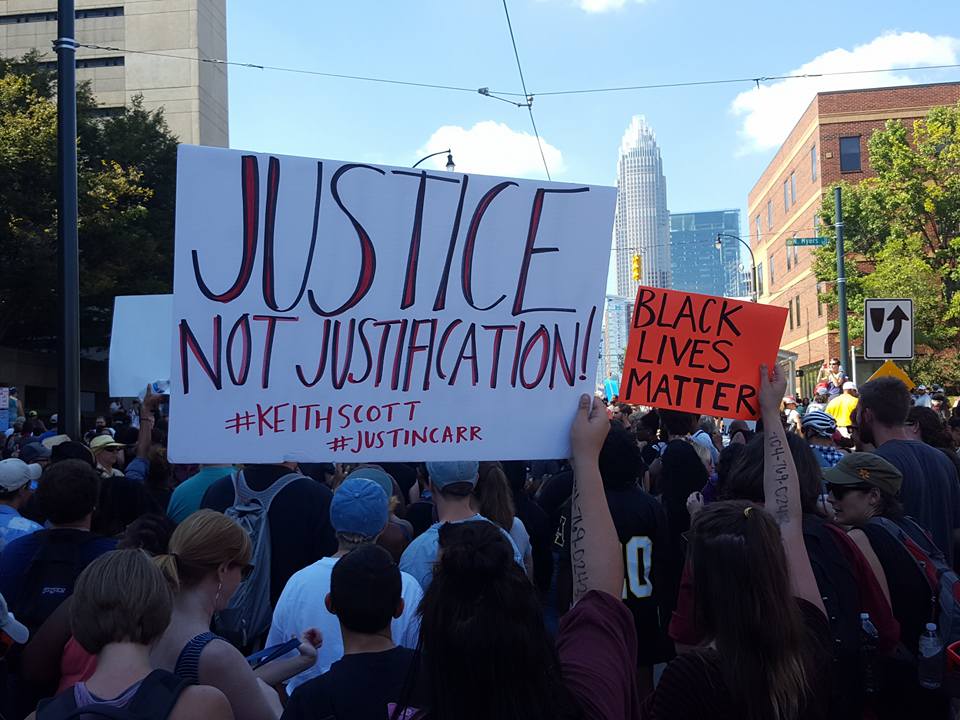
Justice, not justification Lori Khamala / AFSC
Note: When this article was submitted, the very next day, Tuesday, Sept. 27, 2016, another unarmed black man in El Cajon, a suburb of San Diego, was shot by the police. I hope you read this article and are able to come to the realization that indeed our countrymen of color are under militarized police attack. From my lens, tax payers should be concerned and interested in the rising numbers of unjust fatal shootings. And recognize that your non-interest, non-action hurts communities of color. Your silence can be mistaken for support in these rash killings by the police. I encourage you to do more, doing nothing is not the answer. I respect and value law officers because I grew up with officers in my family. I also respect and find value in a social system that lifts up equitable justice, ethics, morals and transparency in doing social good. - Toni
On Sept. 20th, 2016 Keith Lamont Scott was gunned down by a police officer in Charlotte, NC. His deadly circumstances played out on American streets like far too many police shootings. This killing struck a nerve.
As a Black, educated woman with two male boys, I fear for their safety when it’s dark outside. In the United States, we know slavery was abolished in 1865. However, as Bryan Stevenson says, “Slavery didn’t end, it just evolved.” Black voices have shouted out, “There’s a siege upon people of color, the orders seem to be number one: incarcerate or number two: shoot to kill.” The shootings we see are born of the same root as slavery and Jim Crow. How much “strange fruit,” how many lynchings before we as a society say, “Enough!”
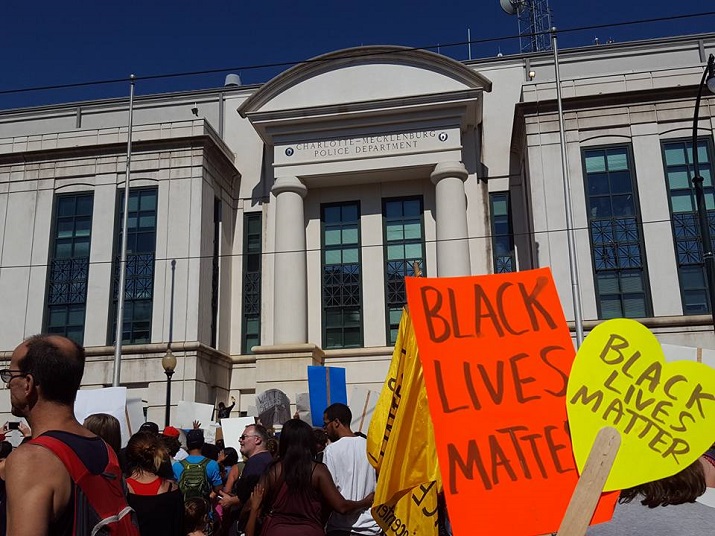
For me there have been many, many times when I think quietly to myself and ask, “Will my boys be targeted, will they survive?” I think every parent of Black or Brown children has similar thoughts.
The street reality is that when a police officer interacts with Black or Brown folks too often a shot is fired.
I am not a school teacher, nor a sociologist. I can see, and not just because I am a person with dark skin, but, because I AM a human being, that we as a society have a monumental problem on our hands. And no one at the helm seems willing to take this problem on and speak truth to power.
Our nation is in a “State of Emergency.” What is happening in the U.S. with policing and communities is not isolated. Militarism and racism mix across the globe to oppress communities. People across the globe are watching to see how the U.S. works to resolve the crisis.
Resolving the matter is a bit problematic when our law officials refuse to call these killings a national crisis.
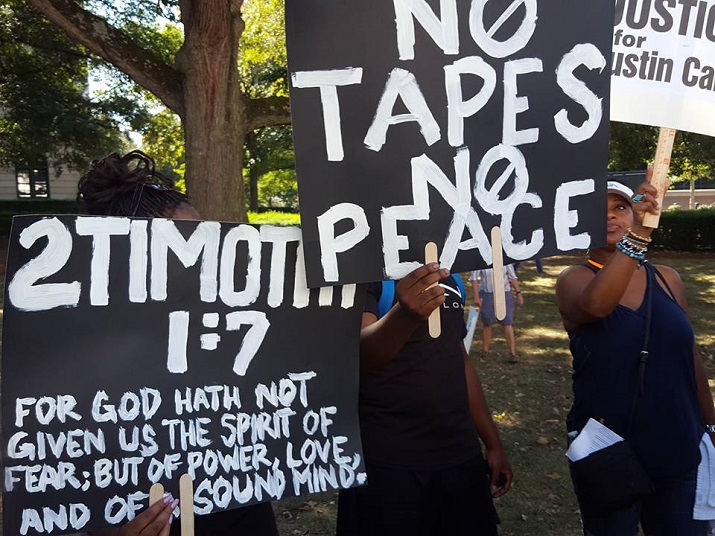
In order to tackle a problem, you have to be courageous to see that a problem exists. Then it’s critical to make a public statement and lead the path in seeking internal and external ways to begin chipping away at old systemic practices and embrace new pathways.
The protesters in Charlotte are saying “Not one more. Enough is enough!” They refuse to add another name of a young, unarmed Black person to a tragically growing list.
It is time for law enforcement officials across states to take a long hard examination at the many fatal interactions with community, and claim failure. Then publicly declare the need for new practices, a new paradigm.
One might ask, why are so many Black Americans killed by the police? Carl Bialik reported, Black Americans are more than twice as likely as white Americans to be killed by police officers.
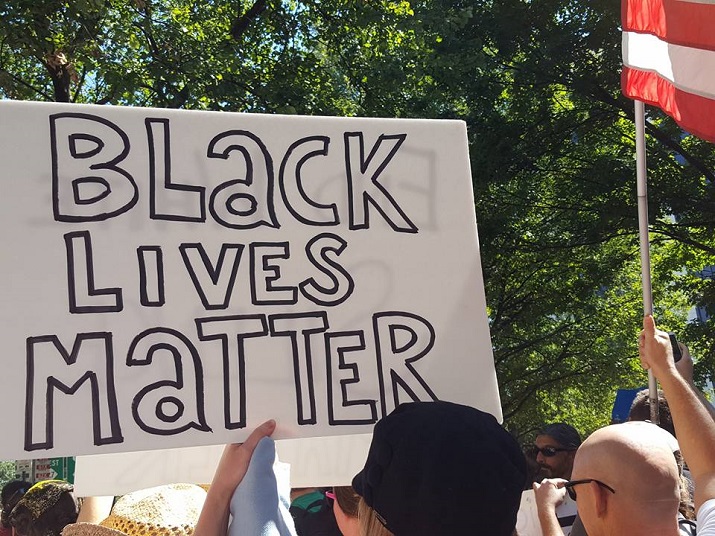
Other statistics indicate people of color, more often Black males, are likely to find themselves face to face with a cop. And in many cases the officer is not exchanging pleasantries, rather, demanding identification for probable cause.
Over and over again, academic researchers provide in black and white that racism, fear and the lack of 21st century police cultural training can contribute enormously to the rise of police shootings of Black people and people of color.
On Monday, September 26th in Charlotte, I attended a public demand and call to action led by North Carolina’s NAACP’S Rev. William J. Barber II at Little Rock A.M.E. Zion church. Rev. Barber made the demands for justice and equality clear. He read out loud calling to Governor McCrory, Mayor of Charlotte and the City Council that full truth and transparency is needed in the following areas:
- release all video footage
- for the U.S. Justice Department to conduct a federal investigation in the killing of Keith L. Scott
- to open and also conduct in-depth investigation into the patterns and practices of the Charlotte Mecklenburg Police Department (CMPD) and make the findings public
- fire the officers at the scene of the killing Mr. Scott who chose to turn off their video devices
- enact a federal standard regarding police use of force, Repeal House Bill 972
- establish a moratorium on racially applied death penalty and restoration of the Racial Justice Act in North Carolina
- prohibit law enforcement officials from racial profiling
- give citizen review boards more authority
- teach of de-escalation and de-militarization of police practices
- call the upon media to broaden the conversation to address all forms of violence and correct the public information about Charlotte—today
- call upon Representative Pittenger and all public officials to make a public statement on their stance on the real criminal justice ‘state of emergency’
- end the denial of Medicaid expansion
- enact a living wage of $15
After Reverend Barber finished reading the list of demands the multiracial crowd, young and old, lined up to march for the sixth night. As I exited the church in the night, I heard the loud roar of rotating blades from helicopters overhead.
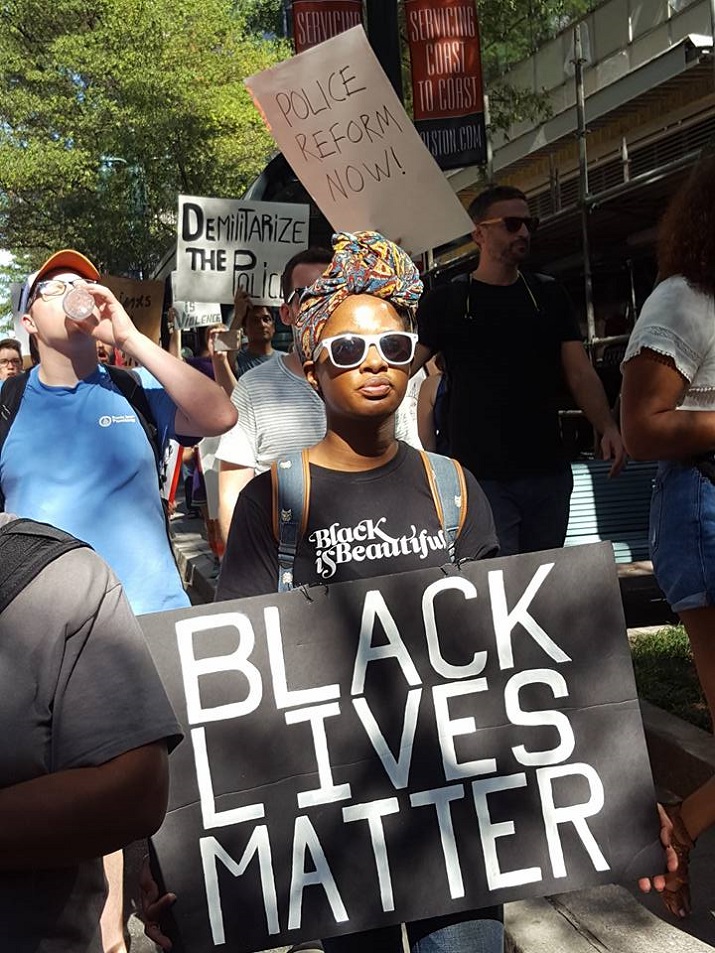
Some were news helicopters but most were police choppers. Immediately I began to panic and my heart rate increased. It was then, in that moment with hundreds of people around, I felt like a standing target—insignificant and stalked.
My anxiety drove me to take cover in my vehicle. I headed home to Greensboro. I wanted and needed time to be alone, to collect myself and dial back the stimulation. Not that I would be any safer, but for ninety minutes during my drive, I could distance myself from my Black reality.
Still I ask, "Will my boys survive? Will I?"
Related Content
Witnessing grief in Charlotte: Protesting the war on Black lives